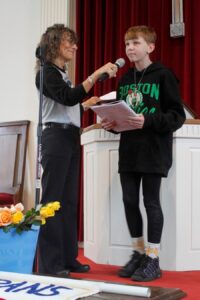CENTERVILLE — “Wow,” said Nina Tepper, smiling as she watched a standing-room-only audience fill the pews, balcony, and vestibule of the South Congregational Church in Centerville on May 20, eager to hear young poets read their work.
Tepper is the organizer of the Voices of Peace Poetry Awards, an event sponsored by the Cape Cod chapter of Veterans for Peace. The crowd put the event’s three-year-long pandemic-inspired pause in the past. The excitement in the air was palpable as student poets from kindergarten through high school prepared to read their work onstage.
Among the 619 poems submitted by students from 39 schools, the work by Provincetown’s young poets stood out: they won 11 of the 79 prizes awarded. “This year has been special,” said Provincetown English teacher Amelia Rokicki.

Before introducing each of the student poets, Tepper praised their teachers for “nurturing a garden of blossoming writers.” Participating teachers from Provincetown were Emily Beaulieu, Emily Burritt, Rokicki, and Eric Shannon. Poet and Fine Arts Work Center fellow Jerroll Watkins worked with Rokicki’s eighth-grade class on their poems. The class won six awards.
This year’s winning poems, Tepper said, explore “the possibilities of peace as it exists within us and in the natural world and the challenges to peace in the face of war and the deep trauma of gun violence.”
Only two of the town’s award-winning poets were able to come to the reading. That’s because the school’s eighth-graders were in London on a school trip. The first-place winner for the sixth grade, Raea Ivey, who also won a poetry prize when she was in second grade, brought her poem to life onstage.
“I was afraid of the crowd,” Raea said, “but also excited.” After announcing the poem’s title, “The Outdoors,” she read about feeling spring’s cool breezes and its warmth and watching the trees blossom into pink petals. The poem ends with a dialogue between the poem’s narrator and a father who walks her home. They place flowers they’ve picked in a vase and eat dinner surrounded by family.
“The poem,” Raea said, expresses “how peaceful I feel when I am outdoors.” But there is sadness under the surface, she added, because she does not see her own father as much as she would like.
Loss and hope are also at play in eighth-grader Lily Smith’s first-place poem, “Finding Peace,” which reflects on the word “evanescent,” defined, she writes, as “soon passing out of sight, memory, or existence” in relation to the recent death of her uncle.
“I will find my peace again,” she writes, “so he can live in my memories.”
Eighth-grader Eve Dower’s poem, “Peace,” suggests that sometimes feeling pain can save us by grounding us in reality. “The numbness grows around me,” she writes, yet being outdoors by the ocean breaks through that. Her poem continues, “My heart quivers, and my lungs fill with the sharp, salty air.”
Rokicki said she was moved by the student writers’ range of themes. She found eighth-grader James Richardson’s poem “What If?” particularly powerful in the way it juxtaposes the simple desires of childhood with recognition of a nation’s trauma.
“What if every day is as good as an ice-cold popsicle on a hot summer day?” his poem opens. But among the questions it asks is this one: “What if I could be in school and not fear for my life?”
2023 Voices of Peace
Poetry contest winners from the Provincetown IB World School
Grade 8: Lily Smith and Eva Dower, first prize; Helena Pabot and James Richardson, second prize; Natoya Hermitt and Zana’e Barrett, honorable mention.
Grade 6: Raea Ivey, first prize.
Grade 3: Lucas Blakeslee and Lulu Morrison, second prize; Jaidyn Blake, honorable mention.
Grade 2: Trent Burritt, honorable mention.
A reading by Amelia Rokicki’s students, including the prize winners from the eighth-grade class, was recorded at the Fine Arts Work Center. A link to the video, “Making Peace: Explorations With FAWC Fellows,” can be found in the online version of this story.



